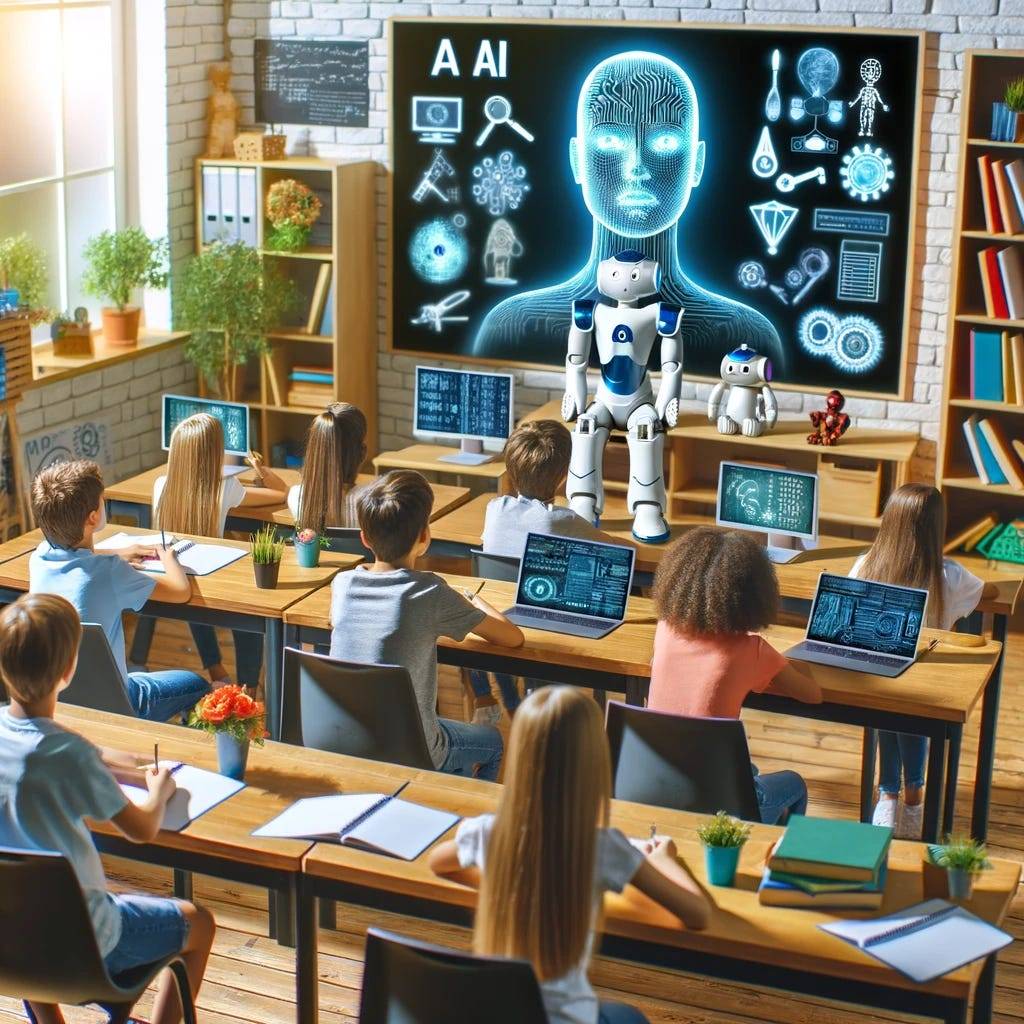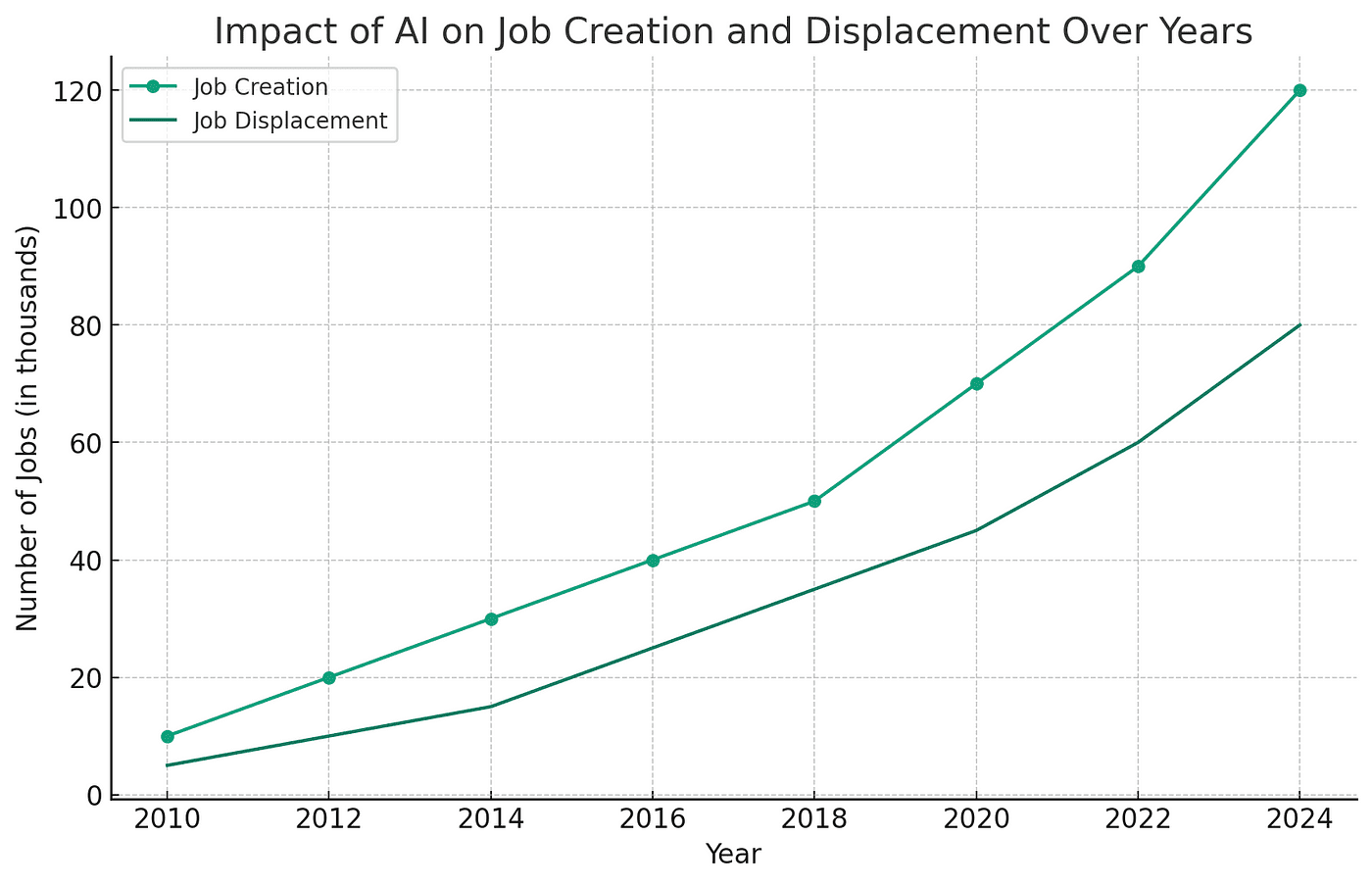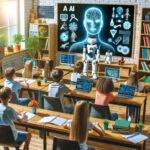
A groundbreaking study shed light on a transformative force in technology: generative artificial intelligence (AI). This innovation, far beyond the traditional AI applications, is poised to revolutionize how we interact with technology, impacting job markets, economic structures, and societal norms. Let’s navigate through the intricate tapestry of changes brought about by this AI evolution.
Understanding Generative AI
Generative AI, a leap from traditional AI, is defined by its ability to learn from vast amounts of data and generate new, original content. This capability positions it as a creator, not just an executor, heralding a new era in technology.
Employment Paradigm Shift
One of the most significant impacts of generative AI is on the global job market, with profound implications for both job displacement and creation. Let’s visualize this changing landscape of employment with the following graph, which vividly illustrates the dual nature of AI’s impact on job creation and displacement over recent years:

The Displacement Dilemma
Routine and repetitive jobs are at the highest risk of being automated by AI. This shift poses a challenge for sectors like manufacturing, administrative services, and certain creative industries, where tasks can be algorithmically replicated.
The Emergence of New Jobs
Conversely, generative AI is also a catalyst for new kinds of employment. It fosters roles that leverage uniquely human attributes such as emotional intelligence, creativity, and complex decision-making. This shift is not just about technology; it’s about redefining the human role in the workforce.
Reshaping Market Dynamics
The influence of generative AI extends to the broader economic landscape, altering the dynamics of markets and competition.
Enhancing Business Efficiency
Generative AI’s ability to automate and optimize processes results in unprecedented business efficiency and innovation. This technological integration leads to superior products and services, ultimately benefiting the consumer market.
Monopolization and Market Fairness
There’s a growing concern that the companies leading in AI technology could dominate markets, potentially leading to monopolization. This scenario underscores the need for regulatory frameworks to ensure market fairness and encourage healthy competition.
The Ethical Conundrum
The creative and mimetic capabilities of generative AI raise significant ethical issues, especially in content authenticity and digital trust.
Crafting Regulatory Frameworks
Navigating the ethical complexities of generative AI necessitates robust regulatory measures. This includes laws to guard against misuse and guidelines to ensure ethical development and deployment of AI technologies.
Educational Transformation
In response to the evolving job market, there’s a pressing need to reorient educational systems and skill development programs.
Emphasizing Adaptive Learning
The focus must shift to fostering adaptability, critical thinking, creativity, and technological proficiency. This approach is key to preparing the future workforce for an AI-driven world.
Economic Ripples: Beyond Business
Generative AI’s impact on the economy is multifaceted, influencing global trade, consumer behavior, and even economic models.
Global Trade Dynamics
AI-driven automation and innovation are poised to reshape global trade. Nations at the forefront of AI technology might gain a competitive advantage, altering the global economic balance.
Consumer Engagement
AI is transforming consumer behaviors and expectations. From personalized experiences to AI-generated content, the way consumers interact with products and services is changing rapidly.
Societal Implications
The societal impact of generative AI is profound, extending beyond economics and employment to influence cultural and social interactions.
Social Dynamics and AI
Generative AI is reshaping social interactions, media consumption, and even political discourse. Its influence on societal structures is far-reaching and necessitates thoughtful consideration.
Navigating the AI-Led Future
The advent of generative AI is not just a technological shift but a societal transformation. Its impact on employment, economic dynamics, ethical considerations, and societal norms is profound and multifaceted. As we navigate this new era, our collective response to the challenges and opportunities presented by AI will shape our future.
Embracing the AI Revolution
The journey with generative AI is ongoing, marked by challenges and opportunities. Our success in leveraging this technology while addressing its risks will dictate the future of our societies and economies. The generative AI revolution presents an opportunity to innovate, rethink job roles, and reshape societal structures.
About Disruptive Concepts
Welcome to @Disruptive Concepts — your crystal ball into the future of technology. 🚀 Subscribe for new insight videos every Saturday!







